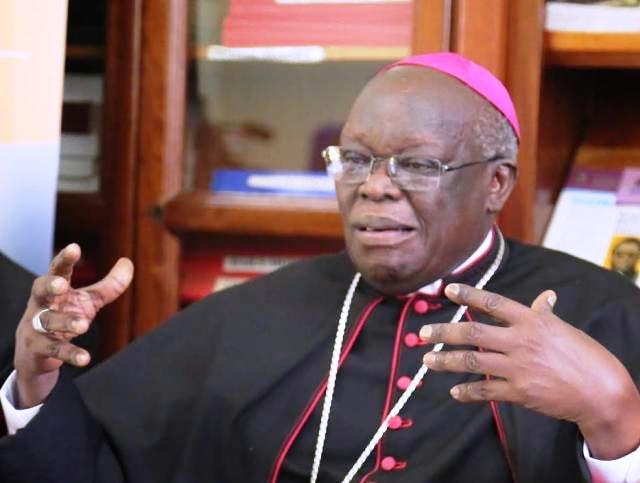We have asked mons. John Baptist Odama, Archbishop of Gulu in Uganda the meaning of the beatification of Father Joseph Ambrosoli.
The beatification of father Joseph Ambrosoli is a blessing not only for the Archdiocese of Gulu, Uganda, where he spent most of his missionary life, nor for Africa alone, the continent he loved deeply, but also for the entire Church and the entire human race.
Father Ambrosoli’s life reflected the love of Christ. And we know that Christ’s love is salvation for humanity from all kinds of evil, especially the spiritual evil we call sin.
He prayed hard to be liberated from selfishness, which is the evil that dominates our world, leading it far away from the dream God has for it. Even as a young man, Father Ambrosoli prayed that Jesus would free him from selfishness, and the love of Christ moulded him in such a way that he became a-man-for-others.
A typical prayer of his was: “O God, deliver me from myself”. A prayer that may seem rather strange to many. Correctly understood, however, it is a splendid invocation addressed to God. And God made him truly free from himself and totally devoted to others. It is a prayer we should all pray always, if we want to live our lives like Jesus Christ, who from being God became the ‘servant’ of all.
By beatifying him, the Church wants to present father Ambrosoli to us as an inspiration to imitate Christ, who lived and died for us all.
In our diocese of Gulu, we already boast two other blessed, Jildo Irwa and Daudi Okello: two young catechists who were killed in the early 20th Century and whom the Church today venerates as martyrs. These three splendid people are not just a monopoly of the people of Gulu, simply because they are from here. Instead, they are a blessing for the whole world.
Father Ambrosoli lived the values of the Gospel and practised what Jesus came to proclaim: salvation. His service to the people was nothing but ‘healing’ and ‘salvation’, especially for the poorest and most abandoned. He used to repeat: “I must love the poor”. He gave himself a slogan: “God is love and I am his servant for the poor and for the suffering”. He really was healing and salvation for many. And that was an extraordinary blessing for us and our people. By proclaiming him blessed, the Church offers us a sure example to imitate. Through his life, he can teach us to be truly human, that is, people who can take interest in and care for others.
Father Ambrosoli was a simple man, humble and pure in his intentions. He served people with total dedication. No one was afraid of him. He was not at all proud, although he could have been, being one of the best doctors Uganda had.
Although he was the hospital’s head doctor, he never drew attention to himself, to the point that some people hardly noticed him. A warder from Gulu had brought a patient to the hospital in Kalongo. As was his wont, doctor Ambrosoli came and started passing between the beds, greeting the patients. After a while, the warder asked a nurse what time the doctor would arrive. “But the doctor has already been here”, she replied. “He even greeted you. But you can join him in his office at any time”. Fr. Ambrosoli was of a disarming simplicity.
I was assigned to the diocese of Gulu as archbishop in January 1999, 12 years after father Ambrosoli’s death. During my pastoral visits to the new diocese, people did nothing but speak well of him to me. They had no doubts: the ‘great doctor’ had been a very special person in all respects. Therefore, I decided to make an investigation and gather precise information about him, especially first-hand accounts of his life.
I thought that, if certain gospel values had indeed been lived by him in a truly exceptional way, they deserved to be made known to more and more people, so that, by imitating him, they would be helped to change their lives. Not only that: their faith would increase and their love for one another would improve. The best way to proclaim the gospel is a truly evangelical life. Dr Ambrosoli’s life really appeared to be such.
The initial work was undertaken by Father Joseph Okumu, who acted as local postulator [the person who guides a cause for beatification or canonization through the judicial processes required – editor’s note].
His work was then passed on to a postulator in Rome, who continued the work by interviewing all the Comboni missionaries who had known Father Ambrosoli closely. All this meticulous work was then collected in a voluminous document, called Positio in Latin: a true examination of the whole life of the ‘great doctor’, trying to show how he had really lived an evangelical life in a heroic way, following the example of Jesus. Father Ambrosoli had not only read and heard the Gospel, but had put it into practice.
When, as a bishop, I ordain a deacon, handing him the book of the Gospels, I tell him: “Receive the Gospel of Christ, whose herald you have become. Believe what you read, teach what you believe and practice what you teach”.
From the day of his diaconate, father Ambrosoli did nothing but this: living the gospel. He was filled with the love of Jesus, so much so that he felt he had to share it. That is why he kept saying: “I must love those who are not loved”.
I want to repeat what I have already said: the beatification of Father Ambrosoli is an inspiration to us all. Blessed Giuseppe Ambrosoli is nothing less than a gift that God gives us through his Church. My wish is that we all learn from him to love as he loved.







